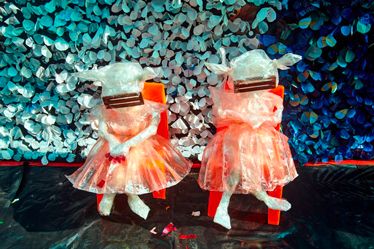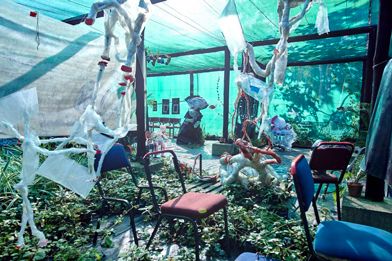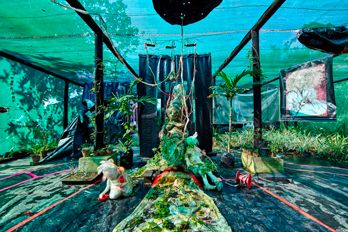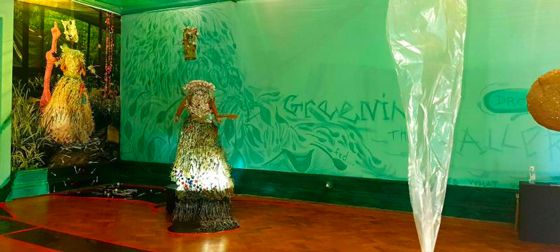Plastic comes to us momentarily useful, and leaves us as waste.
Far from being an innocuous common household item, plastic is a defining material of capitalist violence and consumer desires. With over 400 million tons of plastic produced globally every year and 79% of it dumped in landfills, plastic threatens the lives of many species, water resources and economies.
For Coral Bijoux, plastic grows into an emblem of the disorder to which we are all subjected.

Bijoux is a South African artist tackling social and political issues through her practice. Dreams as R-evolutions, one of her most recent multimedia exhibitions, sprouted as a work in a neglected plant nursery in 2018. Bijoux worked with the space, bursting with its own animal and plant life, to immerse the viewer in a world that allowed them to sit in their discomfort while giving them creative freedom. Sculpted from scraps, she collected plastic from the surrounding dumpsters for her pieces.
The Dreams as R-evolution installation roots itself into the entry space of the Iziko South African National Gallery in Cape Town, transforming the gallery into a site of nature under destruction. From walls streaked green with haunting natural images splashed on them to the almost-familiar plastic creatures, Bijoux tackles the traditional white cube of the gallery and its colonial heritage with an ode of what is to come.



“I am conscious of the effects of the Dreams as R-evolution within this formal structure — in one of South Africa’s older colonial buildings (about 150 years) — the land on which the Gallery sits belongs to us all and as such, we will engage this space as ours, offering new meanings to it,” explains Bijoux, grappling with the centuries-old and historically exclusionary space. “In ‘greening the gallery’, I engage the historical countenance by muralling the walls, inserting icons, symbols and words that evoke the past in the present.”
The play of evolution and revolution in Dreams as R-evolutions contemplates the ability to change the self and the environment. However, Bijoux shuns the neoliberal idea of personal responsibility over social change — a notion that pressures consumers to recycle rather than hold industries responsible for their social and environmental exploitation. Dreams as R-evolution traces the lineage of capitalism from colonialism and slavery, reworking existing narratives.

Bijoux’s exhibition forces binaries — a colonial inheritance we maintain — to collapse within themselves. The distance between the viewer and the artwork, inside and outside, nature and culture, and natural and artificial dissolves. Bijoux denaturalizes the larger oppressive system and the racial and environmental violence that stems from it. Her insurrection of the gallery space conveys that uneven social order cannot be corrected by its own means.
The exhibition juggles to balance neglect and careful transformation, violence and creation, a warning and a prayer for something better. It ponders on what it means to be human on a damaged planet, and how to live in a world that is dying.
With regards to the United Nations Sustainable Development Goals for Reduced Inequalities and Climate Action, Bijoux fashions new life out of waste. The exhibition and nursery become a dreamscape that ventures beyond slavery, the economy and injustice.
Instead, Bijoux delivers the opportunity for all to dream of a world and future in which the oppressed and oppressor are liberated from the systems that bind them.
“What does it mean to dream freely, as free people, when freedom is not available to everyone equally?” asks Bijoux in her article for AGITATE!. “The colonial mindset usurps our ability to be free people who dream freely, both as the colonised or the colonizer. By colonial mindset, I suggest that without considerations of where our conditioning begins and ends, we may find that we possess elements of the colonizer which do not serve us.”
Can we truly envision a future outside the clutches of capitalism and colonialism? The violence is known but the future is shaped by uncertainty. The future will always be something to fear. In response, Dreams as R-evolutions presents a destruction that we must come to terms with and a commitment to hope because of, not in spite of, the destruction we face.
Find more of Coral Bijoux’s artwork here.
